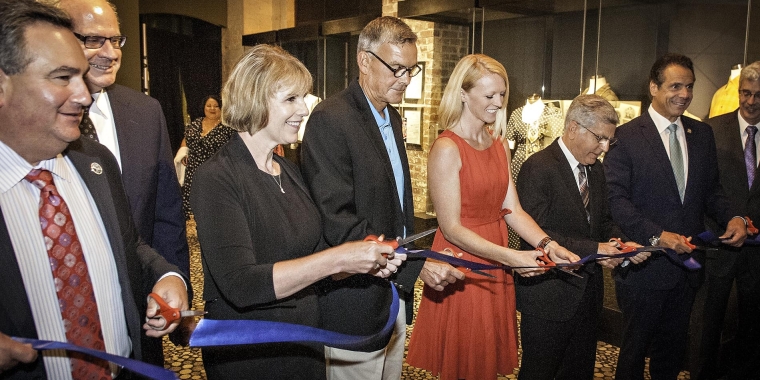
SAFE Act Ammunition Database Suspended
Catharine Young
July 10, 2015
For Release: Immediate, July 10, 2015
ALBANY - State Senate Republicans, led by Majority Leader John Flanagan, have reached agreement with Governor Andrew Cuomo to make administrative changes to the SAFE Act, suspending the ammunition database and background check, announced Senator Catharine Young, (R,C,I-57th District).
The memorandum of understanding (MOU), which mirrors part of a SAFE Act reform bill passed in the Senate, has been signed by Senator Flanagan and Jim Malatros, Governor Cuomo’s Director of State Operations.
The deal is the result of intense three-way negotiations between the Governor, Senate and Assembly at the end of session, which wrapped up on June 25 with the passage of an omnibus bill that renewed the property tax cap and New York City’s rent laws, expanded property tax rebate checks for homeowners, and reformed Common Core and teacher evaluations.
Senator Flanagan repeatedly pushed for statutory SAFE Act reforms during the talks, but was blocked by Assembly Speaker Carl Heastie of the Bronx, who refused to agree, said Senator Young.
As a result, a two-way agreement between the Governor and Senate was formed. Under the signed document, the yet-to-be-established statewide system is suspended, “no certification of the Database as operational shall be made by the superintendent of the state police,” and “no expenditures of state monies shall be allocated for the purposes of purchasing and installing software, programming and interface required to transmit any record for the purpose of performing an eligibility check” for buying ammunition unless both parties agree to proceed. Gun purchasers will continue to undergo a federal background check.
The MOU formally halts the ammunition background check, even though Speaker Heastie is not a co-signer. Senate Republicans have been successful in removing ammunition database allocations proposed by the Governor in state budgets, but sought a more official solution, according to Senator Young.
“This agreement is a victory for every law-abiding gun owner and our hardworking, overburdened state taxpayers. The ammunition database and background check requires unproven technology that doesn’t exist, and establishing it would have cost the state up to $100 million, which would be a colossal waste of tax dollars,” Senator Young said.
“Senator Flanagan is keeping his word that he would work with us to change the SAFE Act. He has shown strong leadership in getting positive results that are important to the people of my district, whether it is reforming the SAFE Act, funding our rural schools, increasing tax relief for our homeowners and businesses, or pushing jobs and economic growth,” Senator Young said.
Repealing the ammunition background checks was part of a bill co-sponsored by Senator Young that would change several elements of the SAFE Act. That legislation passed the Senate on June 9.
Other provisions would allow immediate family members to inherit firearms as part of an estate as long as a background check was conducted; provide more protections for individuals’ data on pistol permits while still requiring the state to release aggregate data; require the state to notify people who are identified as a mental health risk and provide a clearer appeals process; and make the state’s Division of Criminal Justice Services (DCJS) the keeper of the pistol permit information, rather than the State Police.
In the state Assembly, which is heavily-dominated by New York City, the bill stalled even though it had a Democratic majority sponsor, Assemblyman Anthony Brindisi from Utica. A total of 26 Assembly members signed onto the legislation, but it failed to be brought up for a vote on the floor, even as an amendment.
“Assemblymen Andy Goodell and Joe Giglio stepped up as co-sponsors, and they should be lauded for doing the right thing. They especially did a tremendous job getting others to sign on, because they knew the more sponsors there were, the more traction it would get. I am confident they will continue to join me in working to repeal the SAFE Act,” Senator Young said.
The SAFE Act that passed in January of 2013 required that sellers must determine a purchaser’s eligibility to possess ammunition by a currently non-existent, on-line State Police-operated database.
The ongoing costs were to be borne by state taxpayers, who also would be on the hook to pay for equipment needed to conduct the background checks at each point of sale – every retailer across the state that sells ammunition, according to Senator Young.
While Senator Young continues to co-sponsor legislation to fully repeal the SAFE Act, she is hopeful the courts will throw out several provisions not covered by the MOU or the Senate bill that was passed.
Other components of the SAFE Act already have been found unconstitutional, and the controversial law is the subject of several lawsuits.
NYSRPA has joined with the National Rifle Association (NRA) to challenge the SAFE Act in federal court on constitutional grounds, including violating the Second Amendment, Equal Protection Clause, and the regulation of interstate commerce. The plaintiffs also contend the SAFE Act is constitutionally vague.
On December 31, 2013, U.S. District Court Judge William M. Skretny of the Western District of New York issued a decision that invalidated the SAFE Act’s requirement that magazines used and intended for self-defense could only be loaded with no more than seven rounds of ammunition, even though the law allowed for possession of 10-round magazines.
Other elements of the case are being heard on the federal appellate level, and depending on the outcome, eventually may be decided by the U.S. Supreme Court.
###

